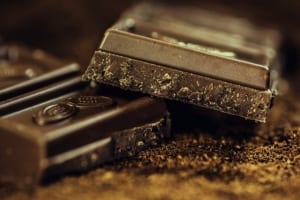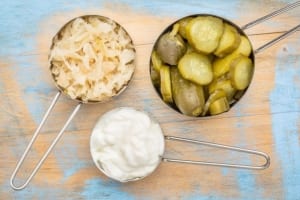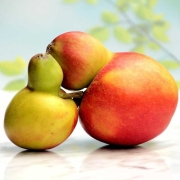Top 6 Food Types to Clear Your Brain Fog and Boost Your Cognitive Function
Do you often experience brain fog? It’s that feeling of mental fatigue that drains your energy, causes poor concentration, and prevents you from gathering your thoughts. I’m sure that many of you can relate to that. Actually, brain fog is a common trend in our modern society. It may occur as a symptom of an underlying illness, side-effects from medication, hidden allergies (e.g. gluten), lack of sleep, dehydration, and even over-eating (i.e. eating too many calories).
However, brain fog is not a medical diagnosis, but a set of subjective symptoms that people experience and describe as:
- Poor concentration
- Mental Confusion
- Eye fatigue
- Headache
- Poor sleep
- A decrease in intellectual productivity
The good news is that there are small tweaks that can be done nutritionally to help clear brain fog, boost energy, and increase productivity. The key is keeping your brain well-fed, nourished, and oxygenated.
1. Drink Up! Water is the way to go.
Water is vital to the proper functioning of human cells and our body systems; it accounts for 60% to 70% of total body weight in lean adults, and 45% to 55% in obese adults. Water plays a major role in brain function; approximately 75% of the processes that take place in the brain occur in the presence of water!
Drinking adequate amounts of water will help increase mental clarity and concentration, help prevent headaches, and help in the removal of toxins and cellular waste that accumulate in the blood and travel to the brain.
How much should you drink? A simple way to calculate your daily water requirement is by dividing your body weight in half and replacing pounds with ounces. So if you weigh 140 lbs., your water requirement is 70 oz. There are two other factors to keep in mind, and the first is physical activity; athletes and active people need more water than sedentary people. The second factor is the weather; during the hot summer months, you need to boost up your water intake even more.
2. Brain Fuel: Omega 3’s
Omega 3s are the most preferred “essential” nutrient to the brain and nervous system. They are called essential because our body does not make them, so we need to get them from our diet.
Among their infinite benefits, omega 3s lower inflammation, protect cell membranes, improve cognition and memory, and improve mood stability.
What to eat: The best sources of omega 3 are fatty fish (salmon, trout, cod liver, herring, mackerel, and sardines), shellfish (shrimp, oysters, clams, and scallops), or krill oil. You may also get omega 3s from plant-based foods, such as flaxseed, chia seeds, or walnuts, however, their conversion to the absorbable form, known as EPA and DHA, is very low – between 5% – 10%.
Questions? Give Us a Call!
3. Rainbow foods: Flavonoids
Flavonoids are plant-derived compounds that have antioxidant properties. They scavenge harmful toxic cellular wastes in the body called “free radicals.” Free radicals damage brain cells and DNA through a process called oxidation, which contributes to brain fog related symptoms.
Studies indicate that flavonoids found in certain fruits and veggies are able to improve memory and brain function, thereby helping to lower symptoms related to brain fog.
Fruits like grapes, pomegranates, strawberries, and blueberries have shown to improve many aspects of memory and learning, such as: rapid and slow memory acquisition, short-term working memory, long-term reference memory, and memory retention and retrieval.
What to eat: Lots of fruits and vegetables! Go for a rainbow of color.
4. Quercetin-rich foods
Quercetin is a flavonol (a subtype of flavonoids) found in plants and known for its antioxidant properties.
Unique to quercetin is its ability to block histamine release, the main trigger for allergies which can cause symptoms of brain fog.
What to eat: Foods that are rich in quercetin are: ancho peppers, red onions, dill weed, cranberries, and buckwheat.
5. Brain Treat: Dark Chocolate
In addition to being delicious, DARK chocolate is a superfood, which means it’s a highly potent antioxidant and brain booster. Cocoa flavonols, which are the active compounds in the cocoa powder found in chocolate, have been shown to increase blood flow to the brain, providing it with an abundant supply of nutrients and oxygen.
Studies have shown cocoa flavonols improve cognitive function and blood pressure control in older adults, improve concentration, and can help stabilize mood.
What to eat: When buying a chocolate bar, the darker the chocolate, the better (look for 70% or more cacao* content). You can also buy good quality, dark chocolate cocoa powder, but you’ll notice it can be bitter, so a great way of getting it in your diet is by adding it to your smoothies.
* Cocoa powder comes from raw cacao that has been roasted at high temperatures.
6. Happy Brain = Happy gut: Probiotic-rich foods
The human body carries over 100 trillion bacteria in the gut, outweighing the human body’s cells! These bacteria work synergistically with the body’s systems and contribute to the synthesis of vitamins and neurotransmitters (brain chemicals), and also help with food digestion.
The gut also hosts harmful bacteria, but in smaller amounts. These opportunistic species thrive on sugars, which can lead to overgrowth and create an imbalance in the microbiome. The connection between the brain and gut is bi-directional, which means if one consumes a high processed meal that is loaded with simple sugars, the brain will suffer from a lack of neurotransmitters and vital nutrients. This leads to brain fog symptoms and potentially other serious conditions. So basically, food choices and a clean diet are tremendous for brain health.
What to eat: Incorporating probiotic-rich food in your diet will help balance gut flora and get rid of harmful bacteria. These foods are Sauerkraut, kimchi, Kombucha (watch out for sugar content), and kefir. Supplementing with probiotics is another great way to get good bacteria into your diet.
We are here for you, and we want to help.
Our goal is to return you to optimal health as soon as possible. To schedule an appointment please call: 703-532-4892 x2
References:
Boots, A. W., Haenen, G. M., & Bast, A. (2008). Health effects of quercetin: from antioxidant to nutraceutical. European Journal Of Pharmacology, 585(2-3), 325-337. doi:10.1016/j.ejphar.2008.03.008
Anand David, A. V., Arulmoli, R., & Parasuraman, S. (2016). Overviews of Biological Importance of Quercetin: A Bioactive Flavonoid. Pharmacognosy Reviews, 10(20), 84-89. doi:10.4103/0973-7847.194044
Linus Pauling Institute | Oregon State University | Micronutrient Information Center | Essential Fatty Acids
Nehlig, A. (2013) The neuroprotective effects of cocoa flavanol and its influence on cognitive performance. Br J Clin Pharmacol. Mar; 75(3): 716–727.
This article was first seen in Dr. Kaplan’s column for MindBodyGreen on 4/17/2017. Reviewed on 9/19/24.

















Leave a Reply
Want to join the discussion?Feel free to contribute!